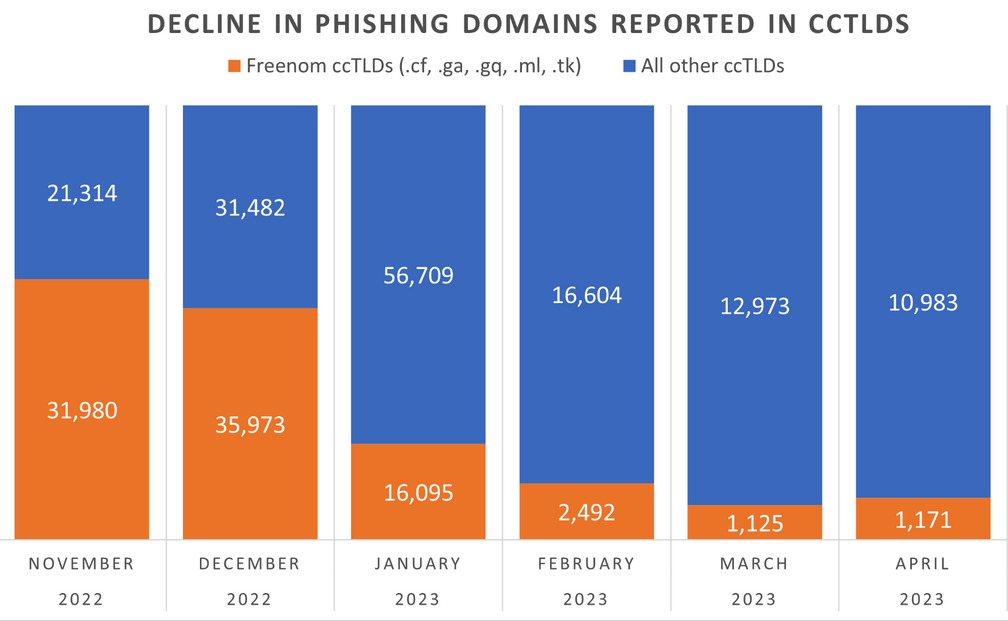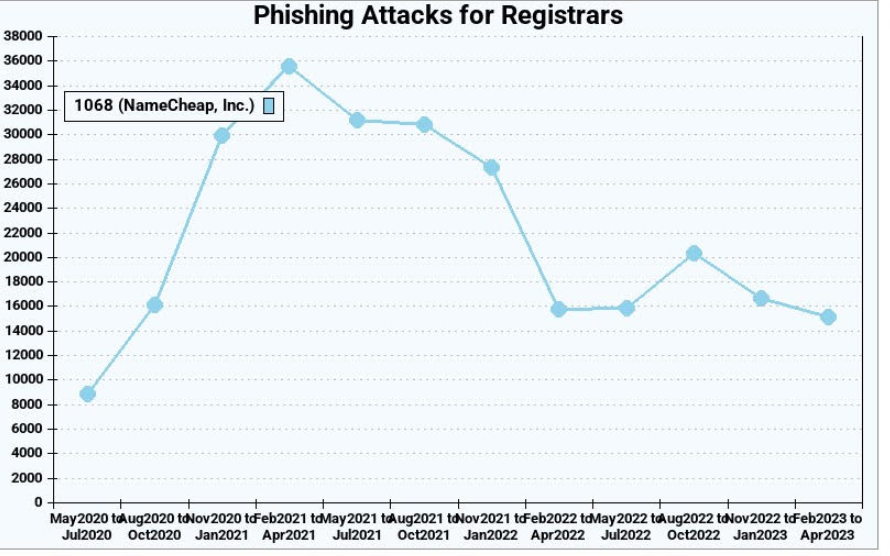[ad_1]
The variety of phishing web sites tied to area identify registrar Freenom dropped precipitously within the months surrounding a current lawsuit from social networking large Meta, which alleged the free area identify supplier has an extended historical past of ignoring abuse complaints about phishing web sites whereas monetizing site visitors to these abusive domains.

The quantity of phishing web sites registered via Freenom dropped significantly because the registrar was sued by Meta. Picture: Interisle Consulting.
Freenom is the area identify registry service supplier for 5 so-called “nation code prime stage domains” (ccTLDs), together with .cf for the Central African Republic; .ga for Gabon; .gq for Equatorial Guinea; .ml for Mali; and .tk for Tokelau.
Freenom has at all times waived the registration charges for domains in these country-code domains, however the registrar additionally reserves the suitable to take again free domains at any time, and to divert site visitors to different websites — together with grownup web sites. And there are numerous experiences from Freenom customers who’ve seen free domains faraway from their management and forwarded to different web sites.
By the point Meta initially filed its lawsuit in December 2022, Freenom was the supply of properly greater than half of all new phishing domains coming from country-code top-level domains. Meta initially requested a courtroom to seal its case in opposition to Freenom, however that request was denied. Meta withdrew its December 2022 lawsuit and re-filed it in March 2023.
“The 5 ccTLDs to which Freenom supplies its providers are the TLDs of selection for cybercriminals as a result of Freenom supplies free area identify registration providers and shields its prospects’ id, even after being offered with proof that the domains are getting used for unlawful functions,” Meta’s grievance charged. “Even after receiving notices of infringement or phishing by its prospects, Freenom continues to license new infringing domains to those self same prospects.”
Meta pointed to analysis from Interisle Consulting Group, which found in 2021 and once more final yr that the 5 ccTLDs operated by Freenom made up half of the Prime Ten TLDs most abused by phishers.
Interisle companion Dave Piscitello stated one thing exceptional has occurred within the months because the Meta lawsuit.
“We’ve noticed a major decline in phishing domains reported within the Freenom commercialized ccTLDs in months surrounding the lawsuit,” Piscitello wrote on Mastodon. “Chargeable for over 60% of phishing domains reported in November 2022, Freenom’s share has dropped to underneath 15%.”
Interisle collects information from 12 main blocklists for spam, malware, and phishing, and it receives phishing-specific information from Spamhaus, Phishtank, OpenPhish and the APWG Ecrime Trade. The corporate publishes historic information units quarterly, each on malware and phishing.
Piscitello stated it’s too quickly to inform the complete influence of the Freenom lawsuit, noting that Interisle’s sources of spam and phishing information all have completely different insurance policies about when domains are faraway from their block lists.
“One of many issues we don’t have visibility into is how every of the blocklists decide to take away a URL from their lists,” he stated. “A few of them outing [listed domains] after 14 days, some do it after 30, and a few hold them ceaselessly.”
Freenom didn’t reply to requests for remark.
That is the second time in as a few years {that a} lawsuit by Meta in opposition to a website registrar has disrupted the phishing trade. In March 2020, Meta sued area registrar large Namecheap, alleging cybersquatting and trademark infringement.
The 2 events settled the matter in April 2022. Whereas the phrases of that settlement haven’t been disclosed, new phishing domains registered via Namecheap declined greater than 50 % the next quarter, Interisle discovered.

Phishing assaults utilizing web sites registered via Namecheap, earlier than and after the registrar settled a lawsuit with Meta. Picture: Interisle Consulting.
Sadly, the lawsuits have had little impact on the general variety of phishing assaults and phishing-related domains, which have steadily elevated in quantity through the years. Piscitello stated the phishers are likely to gravitate towards registrars that provide the least resistance and lowest value per area. And with new top-level domains always being launched, there’s not often a scarcity of tremendous low-priced domains.
“The abuse of a brand new top-level area is basically the results of one registrar’s portfolio,” Piscitello instructed KrebsOnSecurity. “Alibaba or Namecheap or one other registrar will run a promotion for an inexpensive area, after which we’ll see flocking and migration of the phishers to that TLD. It’s like strip mining, the place they’ll purchase a whole bunch or hundreds of domains, use these in a marketing campaign, exhaust that TLD after which transfer on to a different supplier.”
Piscitello stated regardless of the steep drop in phishing domains popping out of Freenom, the options obtainable to phishers are many. In spite of everything, there are greater than 2,000 accredited area registrars, to not point out dozens of providers that permit anybody arrange an internet site totally free with out even proudly owning a website.
“There isn’t a proof that the pattern line is even going to stage off,” he stated. “I believe what the Meta lawsuit tells us is that litigation is like giving somebody a standing eight rely. It quickly disrupts a course of. And in that sense, litigation seems to be working.”
[ad_2]

